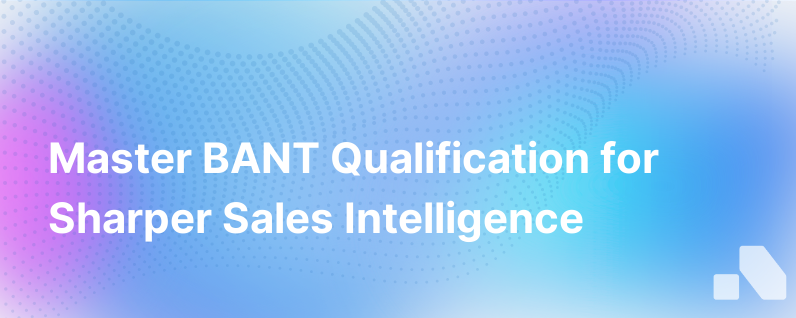
Sales qualification frameworks such as BANT (Budget, Authority, Need, and Timing) have been the backbone of sales processes for decades. They provide sales teams with foundational guidelines for determining whether a prospect is worth pursuing. However, in today’s dynamic and information-rich business environment, traditional BANT qualification needs to be powered up with Sales Intelligence to truly unlock its potential. Sales Intelligence refers to the tools and technologies that gather, analyze and present data to help sales teams understand and engage qualified leads effectively.
Integrating Sales Intelligence with the BANT framework provides sales reps with deeper insights into their prospects, helps them personalize interactions, and improve the accuracy and efficiency of the sales cycle. Let’s take a look at how Sales Intelligence reinvents BANT qualification for contemporary sales strategies.
Intelligent Budget Insight
Budget concerns are often the most straightforward of the BANT criteria; if a prospect doesn’t have the cash, there’s not much point in pursuing the deal. Or is there? Traditional budget qualification might have you walk away from a prospect who doesn’t have the budget, but Sales Intelligence digs deeper.
Sales Intelligence tools can:
- Forecast future budget allocations or changes in financial health by tracking news, earning reports, or funding announcements.
- Identify alternative stakeholders within the organization who might have unallocated budget at the end of a financial period.
- Assess the prospect’s investment in competing products or services, giving a ballpark figure of how much they might be willing to spend. This level of financial insight allows reps to not only qualify based on current budget but also to engage in consultative selling that may influence future budgets.
Authority with Context
Understanding who has the authority to make purchasing decisions is critical in BANT—after all, there’s no point in delivering the perfect pitch to someone who doesn’t wield the pen. The challenge is that organizational structures are often opaque, fluid, and convoluted.
Sales Intelligence platforms elevate authority insight by:
- Mapping out a company’s decision-making unit, detailing the hierarchy and interconnections between various roles.
- Providing real-time data on job changes, announcements, and shifts in decision-making power within an organization.
- Analyzing social media chatter and engagement to identify hidden influencers and internal champions. Sales Intelligence equips sales reps with a nuanced picture of the power dynamics in play, ensuring they focus on the right person at the right time.
Identifying Deeper Needs
Uncovering a prospect’s needs is at the heart of BANT and often determines the complexion of the sales journey. In the modern marketplace, needs are intricate and multifaceted, extending beyond the surface-level pain points.
Sales Intelligence tools enable a deeper dive into needs analysis by:
- Aggregating and analyzing data from diverse sources like news feeds, financial reports, websites, and social media to uncover unmet needs that the prospect may not even be fully aware of.
- Leveraging predictive analytics and machine learning to anticipate future needs based on industry trends and the prospect’s historical data.
- Enabling personalized content delivery that addresses perceived and latent needs, curated from insights collected across the prospect’s digital footprint. Sales reps can use this intel to tailor their solutions, transforming perceived needs into compelling visions of the future for their prospects.
Timing with Precision
A proposal that hits at the wrong time is likely to miss the mark, irrespective of its quality. Timing is especially challenging to gauge, with multiple factors at play that can shift a deal from ripe to wrong overnight.
Using Sales Intelligence to sync timing includes:
- Monitoring prospects for trigger events, such as leadership changes, expansion initiatives, or recent pain points experienced, signaling a readiness to buy.
- Applying data-driven performance indicators to identify patterns when prospects are most receptive to sales engagement.
- Integrating marketing and sales data to refine follow-up timing based on engagement metrics from email, social, and web interactions. Sales reps armed with this information can then approach prospects at the moment they are most likely to be receptive to a pitch.
Best Practices for Implementing BANT with Sales Intelligence
To effectively combine BANT qualification with Sales Intelligence, consider these best practices:
- Data Integration: Ensure your Sales Intelligence platform integrates with CRM systems and other tools to create a unified database of prospect insights that is accessible in real-time.
- Continuous Learning: Implement feedback mechanisms that allow the intelligence system to learn from previous interactions, enhancing its predictive capability over time.
- Actionable Insights: Focus on actionable insights rather than raw data, converting intelligence into practical steps for engagement.
- Training and Adaptation: Train your sales team to utilize Sales Intelligence in the context of BANT. They need to understand not just the ‘what’ but also the ‘why’ and ‘how’ of leveraging this intelligence.
Conclusion
Sales strategies that integrate BANT qualification with Sales Intelligence provide a competitive edge. By deeply understanding the budget, authority, need, and timing in the context of rich, actionable data, sales reps can engage prospects more effectively, build better relationships, and ultimately close more deals.
In the world of AI-powered sales platforms like Aomni, Sales Intelligence is seamlessly integrated into workflows, ensuring that sales teams are equipped with a BANT framework that’s supercharged for the digital age. The sales landscape is complex, but by harnessing the power of intelligence, it’s navigable and ripe with opportunity.